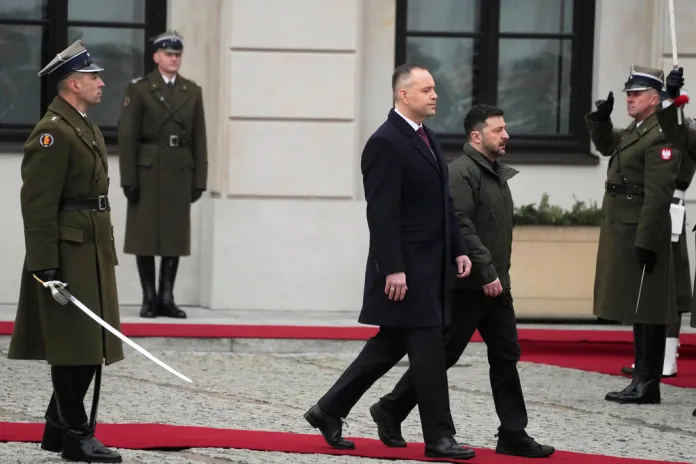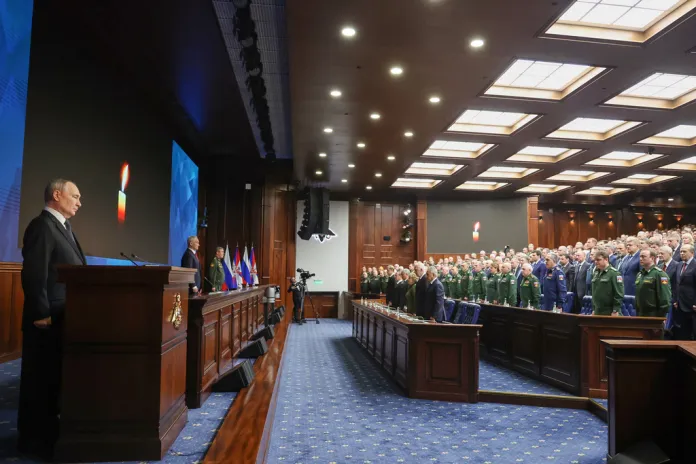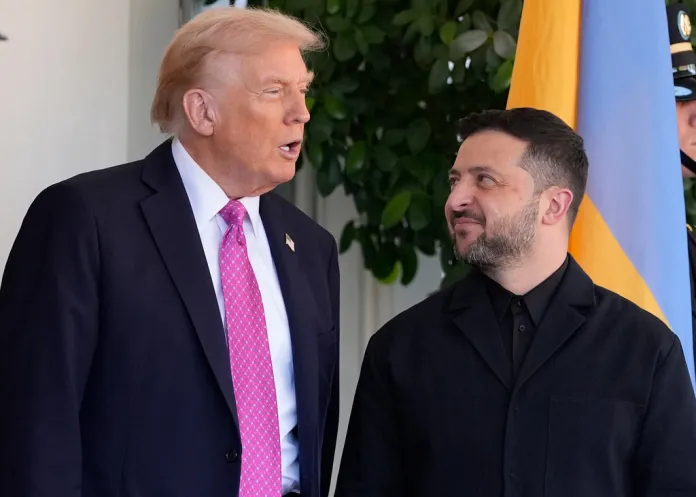What Would America’s Five General-Presidents Say About The Ukraine War?
Tucker Carlson reported Monday night that he sent a questionnaire asking Republican presidential hopefuls some basic questions about America’s strategic interest in Ukraine. These are the results of this questionnaire. You can read the review here, are illuminating — including which potential candidates chose not to respond.
It is becoming increasingly important to get answers from America’s leaders on these issues. The conflict in Ukraine has been going on for over a year, and the United States has spent more than $100 billion in this war. The involvement has not benefited the U.S. or Main Street. Unfortunately, it has benefited its elite instigators. It has been called war “a racket,” In The words of Gen. SmedleyHe is one of the most decorated Marines. American elites seem to be all too content with continuing escalation.
Media, Hollywood, intellectuals and academics. Wall Street with investment banks Blackrock J.P. MorganLeadership of both political parties is also available “all in” Russia. The military-industrial complex, including retired and active senior officers as well as defense contractors, continues to profit from another prolonged military conflict. It is not clear that there is any concern about how this war against a nuclear enemy might escalate uncontrollably as all wars do.
Despite the support of the elites for this proxy war, one group in America is not all in: The citizenry. Recent polls show Less than half of Americans support war in Ukraine. Voters have woken up to the fact that there is a 24/7 propagandistic news cycle. The people who are most likely to be in harm’s path first will always see the problems. Leaders and planners should be aware of the lack of success in three quarters of a century, but elites are rarely the ones who suffer the brunt. We have a long list predicable failures, including Vietnam, Beirut Somalia, Iraq Syria, Libya and Afghanistan.
Despite these current examples, America was not the nation that other nations looked up to for leadership. This article counterposes what another more grounded elite — America’s five combat commanding generals that later became president — would advocate based on their example.
These five general-presidents were Ulysses S. Grant (Dwight D. Eisenhower), Andrew Jackson (George Washington), Zachary Taylor (Zachary Taylor) and Zachary Taylor (Zachary Taylor). Each one of the five general-presidents served in at minimum two wars. One was as a junior officers, and they experienced strong bonds of comradeship during the conflict. “fog and friction” of war with its attendant tragedies and the last as the commanding general under the heavy burden of command. They neither ignored nor skirted risk and emerged victorious from the largest war of their time — wars that created a lasting peace. They were trusted by voters to keep America safe, prosperous, and they became popular two-term presidents, except for Taylor who died too soon in office. None of them started a war. But, President Donald Trump and every vice president of the 21st century have never been in an operational army, and none of them have ever started or extended a war.
None of these five general-presidents ever dreamed of war. Grant said it best. “Though I have been trained as a soldier, and participated in many battles, there never was a time when, in my opinion, some way could not be found to prevent the drawing of the sword.” Each of them had already established their reputations upon entering the White House without much to show. Each of them was concerned about the common soldier in conflict and the common citizen at peace. Their well-being was essential. You can’t win wars if you have dispirited armies and a weak homefront. If ever there was a choice, it would be to choose a “war of choice,” These five men would never choose war.
They were all chosen because of their ability to demonstrate a steady, unselfish temperament in combat. They were also known for being able to maintain an objective and unattached view of complex strategic issues. What are the opinions of the five most elite general-presidents about America’s involvement today in Ukraine? “wars of choice”?
George Washington
Washington’s two terms were focused on keeping the nation he founded together and away from danger. He also tried to build a professional and strong military. He advocated for strong military forces to protect America. He did not like the military adventurism that supported the European empires of his era.
When the British threatened to invade American territory from the North, Washington avoided unnecessary crossing them. To the dismay of James Madison and Thomas Jefferson, Washington remained neutral during the Napoleonic Wars. He sided with neither France or Britain.
Washington’s departure was marked by his resignation. Farewell Address America’s most important document for guiding the nation, following the Declaration of Independence and the Constitution. It called for unity in the nation, political moderation, civility, virtue, religion and education, as well as fiscal discipline to reduce debt. These are important points that are even more pertinent than ever.
Andrew Jackson
Jackson, the hero of Battle of New Orleans, said that he was “born for a storm.” He presided over a peaceful period of peace, cooperation, high growth that was not possible during ongoing wars.
FDR later spoke highly of him. “History depicts Andrew Jackson as the last truly honorable and incorruptible American president.” H.W. Brands spoke of Jackson “[The American people] placed their faith in him because he placed his faith in them.” As a general, Jackson concerned himself with keeping the interfering and warring European empires — Britain, France and Spain — off the American expanse. Jackson himself summarised his own era well:
There have never been thirteen million people in history, from the earliest times of human existence to the present. [sic] of people … who enjoyed so much freedom and happiness as the people of these United States. There’s no reason to worry about danger from overseas. … It is from within, among yourselves — from cupidity, from corruption, from disappointed ambition and inordinate thirst for power.
His primary task was to preserve America and stop elites from gaining too many power. He ended the Second Bank of the United States. He was the president that eliminated the national credit. It was the opportunity for western expansion and keeping out of war that led to a long and prosperous peace.
Zachary Taylor, Ulysses S. Grant
Before either Grant or Taylor had any presidential thoughts, they served together in the Mexican War. Both were reluctant warriors. Taylor’s views on war were, as it is not surprising, predated Grant’s. Nearly exactly, “My life has been devoted to arms, yet I look upon war at all times, and under all circumstances, as a national calamity to be avoided.”
Both believed that the Mexican War was immoral and President Polk created a casus belli. This is similar to recent wars. Grant would later link the Civil War and the Mexican War years later, saying: “The Southern rebellion This was largely a result of the Mexican War. Nations, like individuals, are punished for their transgressions. We got our punishment in the most sanguinary and expensive war of modern times.” Leaders today should take note of Grant’s insight.
Taylor and Grant would provide the most generous of surrender terms when the time was appropriate. Though he was nicknamed “Unconditional Surrender” for his tough terms at Fort Donelson and Vicksburg, Grant at war’s end during the Appomattox surrender deftly let up on Lee, making sure he was not humiliated and provided the softest surrender terms he could, thus avoiding an interminable guerrilla war he feared. Grant then only wanted the senseless killing to cease. Upon signing the documents, Union soldiers began a celebratory 100-gun salute. Grant immediately stopped it saying, “The war is over — the rebels are our countrymen again.”
Both Taylor and Grant worked to bring the country back together during their presidencies. Taylor failed at this because of his premature death. Grant failed because the North and the South wanted to forget the war and its cause despite Reconstruction being unfinished: Americans have no taste for lengthy, costly wars.
Dwight D. Eisenhower
Eisenhower’s presidency provides many relevant examples for today. Like the four general-presidents before him, he abhorred war. And like Grant, whose campaign slogan was Let us Have Peace, Ike promised peace by ending the Korean War that led to President Harry S. Truman’s downfall. Ike almost immediately succeeded by quietly intimating the use of nuclear weapons but not with Biden’s public intimidating bluster. Unlike Truman who equivocated about escalation and had no credibility, Eisenhower was taken seriously: Korea’s north-south border was settled at its original location, providing China with the breathing room it desired.
Another set of problems emerged just before Ike’s reelection. Two crises erupted: the Suez Canal crisis and the Russian invasion of Hungary — two or more potential hot wars at once. In Hungary, the Russians reoccupied their satellite, crushing its new liberal government. Meanwhile, Egypt’s Gamal Nasser occupied the canal zone controlled by Britain and France.
Ike’s response in Hungary was not to risk a wider war given Hungary’s strategic location close to the then-USSR. In the Suez Canal, France, Britain, and Israel invaded the zone without informing the United States. Eisenhower realized siding with Britain and France would stir up the enmity of the Third World against America. He felt it wise not to be perceived as another unfeeling colonial power.
He put it to his Ivy League advisors, “Nasser embodies the demands of the people of the area for independence and for ‘slapping the white man down,'” something elites today should note. The U.S. stopped trading Britain’s bonds in the market, and the invasion stopped immediately. The U.S. today no longer compares to its former self — America no longer has the economic power it once did, and the arrogant assumption that America will be able to weaponize financial policy to punish enemies is no longer valid as we have seen with Russia.
Finally, like Washington, Eisenhower gave a long-reaching warning about the military-industrial complex with its own prerogatives in his own Farewell Address, which ranks second to Washington’s in prescience.
In addition, these five abhorred the unethical politics and behavior that accompany war: inflated currencies, speculation, profiteering, and corruption. Today inflation is already raging at home, and these excesses in Ukraine guarantee more money laundering back to the U.S. for America’s elites, something all five would have stopped. Finally, outside of war, all five general-presidents would agree upon the defense of the Constitution, defending the sanctity of America’s borders, and keeping the country together physically and without factions, all of which have been forgotten by the Biden administration.
Instead of following the clear and simple examples of these general-presidents that were humble conservators, we see the use of supposedly clever intellectual stratagems like “graduated pressure,” used by Secretary of Defense Robert McNamara during the Cuban Missile Crisis that was somewhat successful, and a complete costly failure in Vietnam. Unlike the general-presidents that understood Murphy’s Law and the law of unintended consequences, the current intellectual elites believe they can finesse war.
Gen. William T. Sherman famously observed, war “is cruelty and you can’t refine it.” Elegant stratagems have proven time and again to be recipes for disaster. The Ukrainian strategy will fail, and as Grant observed, “Nations, like individuals, are punished for their transgressions.” The Third World is not lining up to support woke America. This war will not only destroy Ukraine, but it will backfire for the U.S., either by escalating into a full-fledged World War III or by causing the American people to take matters into their own hands and vote the elite perpetrators out. Such U.S. political bullying only serves to alienate most of the world, something the five never would have considered.
Thankfully, the leading Republican candidates appear to agree not only with the people but also with the historic counsel of these popular five warrior presidents that advised great caution in getting involved in unnecessary wars. The tide appears to be turning none too soon on avoiding reckless wars.
Pat McKim, a graduate of the Naval Academy, the Naval War College, and Harvard, served Sen. Wilson, R-Calif., on SASC and is a retired Navy Captain (Reserve). In business he has run Internet software companies. He is working on his first book: “Warriors in the White House.”
“From What Would America’s Five General-Presidents Say About The Ukraine War?”
“The views and opinions expressed here are solely those of the author of the article and not necessarily shared or endorsed by Conservative News Daily”
" Conservative News Daily does not always share or support the views and opinions expressed here; they are just those of the writer."




